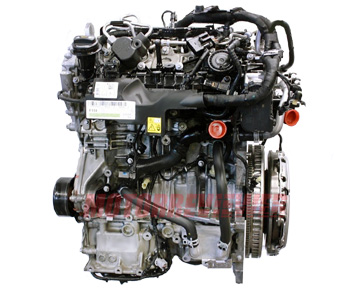Mercedes M282 1.3L Engine Specs, Problems & Reliability

Mercedes-Benz M282 Info
The Mercedes-Benz M282 is a 1.3-liter inline four-cylinder turbocharged and direct-injected engine developed by Daimler in partnership with Renault-Nissan-Mitsubishi Alliance. The M282 engine made its debut in 2018. Nowadays, Mercedes uses this 1.3L turbo-four in almost every front-wheel-drive model: A-Class, B-Class, CLA, GLA, and GLB. M282 1.3 engines are assembled in Germany at Daimler's factory in Kolleda. Renault and Nissan's engines are produced at Alliance's industrial facilities in Spain and the United Kingdom. Renault brands this engine as 1.3 TCe H5Ht (or TCe115, TCe140, TCe150, and TCe160), and Nissan gave it the HR13DDT code name. Let's take an in-depth look at the Mercedes-Benz M282 engine design, the most common problems, reliability, and longevity.
M282 Engine Overview
The M282 engine is built around an aluminum, open-deck-style cylinder block developed by Renault. The engine doesn't have cast iron sleeves. Instead, there is a bore spray plasma coating on the cylinder walls. It is a thin layer of very hard steel on the surface that enhances heat conductivity, minimizes friction, and reduces the overall weight of the engine. The crankshaft and connecting rods are forged steel. The piston skirts have an Eco-Tough coating. It is a high-wear-resistant, special graphite coating for optimized friction. The engine block has oil squirters (piston cooling jets) that spray oil onto the underside of pistons to help remove heat. The oiling system features a variable-displacement oil pump, which operates more efficiently with different capacities depending on engine needs.
The cylinder head was developed by Mercedes. It has a very unusual triangular "Delta" design. This aluminum 16-valve cylinder head is slightly higher but much narrower and lighter than conventional rectangle heads. This design also includes semi-integrated intake and exhaust manifolds. The intake and exhaust camshafts come with variable cam phasing (twin independent variable valve timing). The M282 uses a single-row timing chain, which should last the entire life of the engine. The intake and exhaust valves are actuated via finger follower-type rocker arms equipped with hydraulic guidance supports.
The Mercedes-Benz M282 features a direct fuel injection system. This is why the engine is equipped with a high-pressure fuel injection pump. It creates up to 250 bar of fuel pressure inside a fuel distribution common rail. The high-pressure fuel pump is driven by an intake camshaft via a roller pushrod. The intake camshaft has an additional 4-lobe cam for this purpose. The common rail is connected with direct injectors, which spray gasoline directly into cylinders. The 6-hole injection nozzles are centrally located in the combustion chamber, providing a homogeneous and efficient combustion process. The key component of the M282 engine is a turbocharger. The engine features a mono-scroll turbocharger with an electronically controlled wastegate. The exhaust manifold and turbocharger body are cast as one piece. An air-to-air intercooler reduces the temperature of compressed air before sending it to the intake manifold.
In addition to the catalytic converter, the M282 engine has a particulate filter (OPF) as standard. Many improvements were implemented for noise emission reduction. For example, the intake manifold features a Helmholtz resonator, the catalytic converter has insulating seals, and its cover also reduces noise. Also worth noting, the M282 engine is the first four-cylinder Mercedes-Benz engine to feature a cylinder deactivation system (in connection with the 7G-DCT gearboxes). The motor can shut off the second and third cylinders in the partial load range between 1,250 and 3,800 rpm.
Engine Specs
Mercedes-Benz 1.3L M282 Engine Problems and Reliability
Is the Mercedes-Benz M282 a good and reliable engine? We believe this 1.3L I-4 turbo engine earns above-average praise for reliability. Even though the engine is still new for Mercedes, hundreds of thousands of Renault vehicles with 1.3 TCe engines are already on the roads around the world. And it looks like this jointly-developed 1.3-liter turbocharged engine doesn't have any serious design flaws. However, there are some possible issues the 1.3L M282 may run into.
M282 Common Problems
There is the list of the most common Mercedes-Benz M282 engine problems known to date:
- Excessive oil consumption
- Carbon build-up
High Oil Consumption
We are classifying excessive oil consumption as common, but it is actually not so common. However, some owners reported progressive oil consumption, starting at low mileages. In most cases, the cause of this problem was defective parts (oil rings, pistons). But we also should take into account that this type of small-displacement turbo engine with direct fuel injection is prone to consuming more oil under heavy loads than most naturally aspirated engines with a comparable level of performance. Injected fuel may wash out oil from the cylinder surface, which, by the way, looks like a mirror thanks to the NANOSLIDE process, and cause extensive wear on piston rings and cylinder walls. This may lead to increased oil consumption in some engines as they age. Therefore, it is very important to use quality oil that meets all the required specs.
Carbon Build-up
The second problem is also related to the direct fuel injection system. Engines with direct fuel injection more or less suffer from carbon buildup on the intake valves and ports. But don't worry too much; most M282 engines will likely live their whole lives with excess carbon deposits. The carbon buildup may have a noticeable impact on performance only in some rare cases.
Mercedes-Benz M282 Reliability Summary
Summing up, the Mercedes-Benz M282 engine does offer a great balance of fuel economy, power, and reliability. We believe this small engine will last more than 160,000 miles (250,000 km). But keep in mind that proper maintenance and oil changes are key to ensuring a reliable experience with the 1.3 M282 engine.
